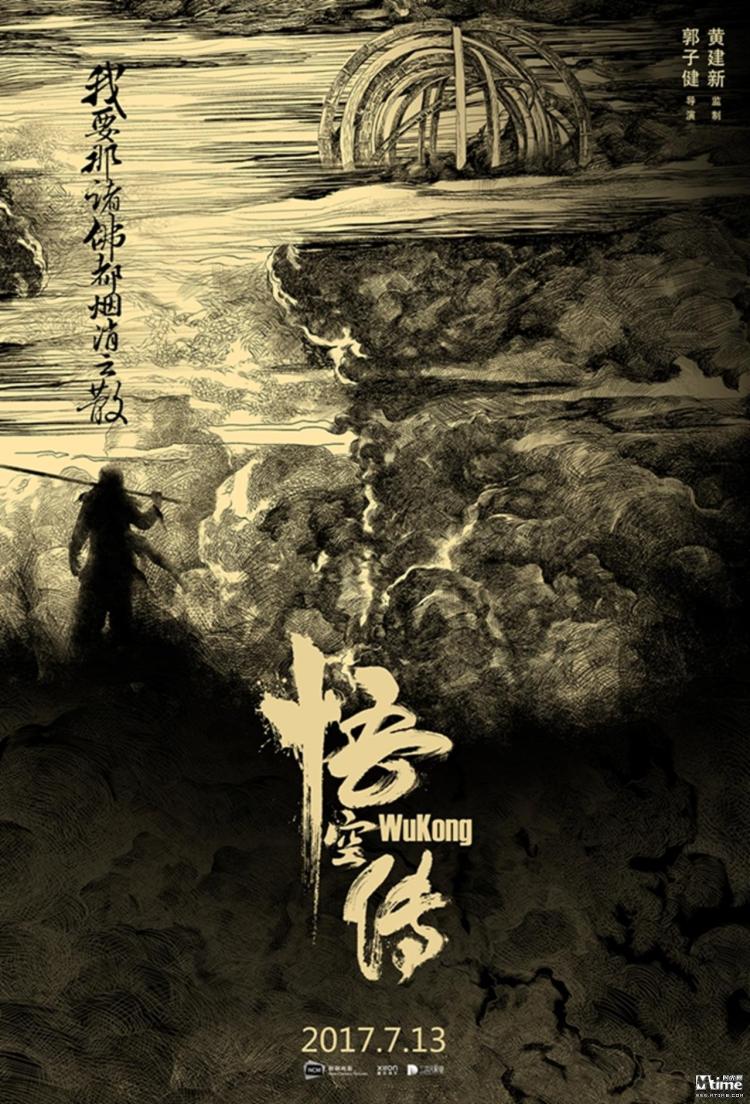 As it stands, contemporary Chinese cinema is veering dangerously close to Monkey King fatigue. Stephen Chow brought his particular sensibilities to the classic Journey to the West before Donnie Yen put on a monkey suit for Cheang Pou-soi, both of which were quickly followed by sequels. Eddie Peng is the latest to pick up the staff for Gallants’ Derek Kwok, though this is a much more youthful incarnation of the iconic hero, acting as a kind of prequel to recent incarnations and as a coming of age tale for the titular “demon” as recounted in the popular online novel Legend of Wukong by Jin Hezai. Told in grand style, Kwok’s Wu Kong (悟空传, Wù Kōng Zhuàn) is a star studded box office extravaganza but embraces both extremes of its family friendly, mainstream blockbuster thrills.
As it stands, contemporary Chinese cinema is veering dangerously close to Monkey King fatigue. Stephen Chow brought his particular sensibilities to the classic Journey to the West before Donnie Yen put on a monkey suit for Cheang Pou-soi, both of which were quickly followed by sequels. Eddie Peng is the latest to pick up the staff for Gallants’ Derek Kwok, though this is a much more youthful incarnation of the iconic hero, acting as a kind of prequel to recent incarnations and as a coming of age tale for the titular “demon” as recounted in the popular online novel Legend of Wukong by Jin Hezai. Told in grand style, Kwok’s Wu Kong (悟空传, Wù Kōng Zhuàn) is a star studded box office extravaganza but embraces both extremes of its family friendly, mainstream blockbuster thrills.
So, Sun Wu Kong (the Monkey King), as you know, was born from a stone atop Mount Huaguo – a remnant of a giant who attempted to battle the heavens but was defeated. Heaven fears the existence of the mischievous demon and determines to destroy him but he’s saved by a teacher who gives him a human form and the name Sun Wu Kong. Devastated by the destruction of his homeland, Wu Kong (Eddie Peng) vows revenge on the Heavens and travels to voice his concerns in person. Resenting his “destiny” Wu Kong focusses his attentions on destroying the divine astrolabe which ascribes fate to all beings, but little does he know that its guardian, Hua Ji (Faye Yu), wants his heart for herself so that she might rule all of Heaven and Earth.
Kwok opens with a beautifully designed sequence modelled after traditional chinese ink paintings in which he recounts the pre-history and birth of the demon later known as Sun Wu Kong. Unlike some other recent attempts to tackle this famously fantastical world, Wu Kong boasts fabulously high production values as well as much better special effects than most Chinese blockbusters, and it helps that Eddie Peng is not burdened with spending the majority of the movie in prosthetics.
Nevertheless for all the lack of actual plot, there is a lot going on and the brisk pace of the exposition filled opening is hard to follow (but, thankfully, details are unimportant). As in his other adventures, Wu Kong ends up with a collection of friends and enemies including love interest Azi (Ni Ni) – the equally rebellious daughter of Hua Ji who has just returned from 100 years in “re-education” exile and fiercely resents her mother’s cruel and controlling nature. Likewise her half brother, Erlang (Shawn Yue) has also arrived home at just the right/wrong moment and is conflicted in his views towards the Heavens – wanting to be accepted as a true “immortal” but also wanting to protect his little sister, so obviously unhappy with the ruling regime. Two more cohorts appear in the gadget laden Juan Lian (Qiao Shan) – a kind hearted man with a hopeless crush on Azi, and the lovelorn retainer, Tian Peng (Oho Ou), still pining after his childhood sweetheart who was exiled to the mortal world.
Much of the central drama occurs after Wu Kong, Erlang, and Tian Peng destroy “The Bridge of Destiny” and are cast down to the mortal world themselves along with Juan Lian and Azi. Finding themselves in a desperate village which happens to be on the former site of Mount Huaguo, the five start to believe they’ll never be going home and discuss staying to help the villagers defeat the “Cloud Demon” which has been stealing all their water. Interacting with the villagers teachers each of them some vaiuable lessons, but “destiny” is still waiting, and trying to change the fate of these desperate people may have disastrous, unforeseen consequences.
Once again, Wu Kong’s battle lies in the Heavens and may end up costing more than it gains. Kwok’s direction is conventional in one sense, but also manages to add a youthful energy which befits the film’s message. Wu Kong’s rebellion is the same as many a young a man’s – against a pre-ordained fate. As he puts it in the punkish final title cards, he will not be blinded by the sky or bound by the Earth – he will decide his own destiny and will never submit himself to the authority of any god or Earthly power. Attempts at melodrama largely fall flat, as does the unwise decision to shift to fantasy sequences for moments of high emotion, not to mention the inclusion of a sappy pop song to really ram home the theme of tragic romance, but whatever Wu Kong’s failings it succeeds brilliantly in its primary objective as an admittedly vacuous summer blockbuster primed to speak to the hearts of hemmed in teens everywhere.
Currently on UK release at selected cinemas.
Original trailer (Mandarin with English/simplified Chinese subtitles)

Is this going to be Ip Man all over again with numerous versions from different directors popping up, each telling the same story but in a different and conflicting way?
Yes. I am afraid so. 😩
Then I look forward to Wong Kar-wai’s arty interpretation in the near future…. 😛
Every cloud! 🤣